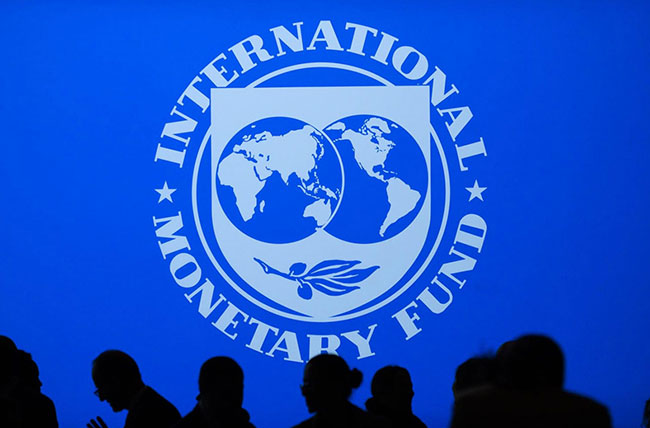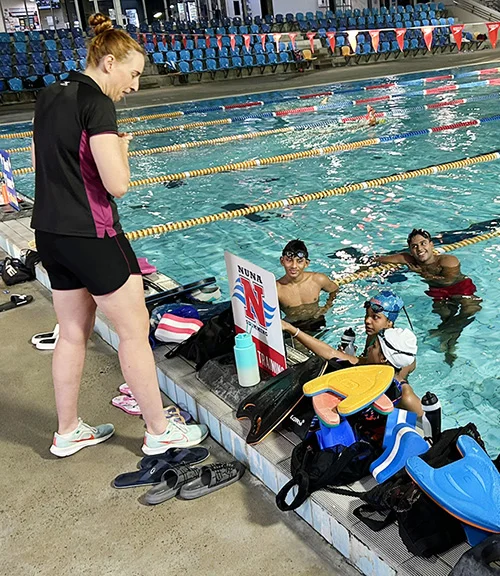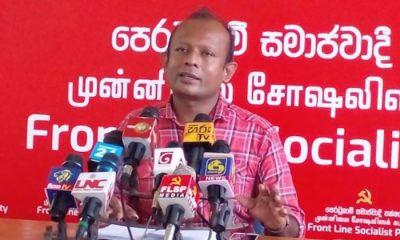Features
Is the IMF a Member of the UN Family?

by Dr Sarala Fernando
The UN Secretary General seems to think so when he recently urged the Security Council and the Bretton Woods institutions to undertake reforms. Yet as the IMF programme unfolds in Sri Lanka one can see the divergence in the methods and objectives deployed by the IMF with its emphasis on domestic fiscal reforms and the UN which is advocating sustainable development, strengthening of health, education and protection of the environment and addressing global emergencies like climate change.
The mismatch is reflected in the growing chasm between the government and the public. The government had hoped that after Covid, Sinhala/Tamil New Year would be held in grand style this year, even providing funds to government institutions to organize events. Contrary to such expectations this year was marked with an absence of the usual cacophony of celebration. Instead of fireworks, the regular tv and radio counted down the auspicious times. The public was protesting the escalating cost of living as a result of new taxes, rupee depreciation causing food inflation, closing of enterprises and loss of jobs under the current IMF programme.
Reports galore on the increasing “misery” level with the deterioration marked among the most vulnerable under five-yearnold children, while women appear to be among the most affected whose plight, suicides, domestic violence, despair, are shown on live tv every night. Added to the woes it seems a sort of apathy has gripped the working people – that is those who have not been able to go abroad – seeming to prefer to voice their grievances and sink into depression rather than buckle down to work harder for more pay. Fortunately in Sri Lanka in time of any crisis, there is a huge network of humanitarian relief provided by the private sector, religious organizations, NGOs and concerned individuals which is making up for what the government cannot do.
People are asking now about the real cost/benefit of the IMF deal especially since it turned out that a substantial amount of the first tranche went back to the multilateral banks and bilateral lenders like India to meet outstanding debt repayments, as part of the IMF conditionality. In contrast, Bangladesh made the first positive move, offering to defer debt repayment on their $500 loan for another six months followed by India offering one year’s deffered repayment on their billion dollar loan.
The government argues that the IMF deal is a seal of approval opening the way for more assistance from multilateral banks and bilateral investors. But multilateral assistance has been slow to disburse in Sri Lanka such that when Covid hit, the World Bank just canceled their unutilized projects and redirected balances for the urgently required vaccines (in the haste, cancellation may have included expenditures already made by the government and not yet forwarded for reimbursement).Now the ADB has done the same, repurposed unutilized grants for emergency assistance of $350 million. For multilateral assistance to be well utilized there must be a strong domestic disbursement tracking system in place for timely reimbursement –has that been put into place and has the IMF provided necessary advice on that?
An early catastrophic consequence of the recourse to the IMF has been instead of strengthening human capital, there is an exodus of skilled workers and professionals for foreign employment leaving Sri Lanka’s flagship health and education system in dire straits, beset by strikes and shortages of equipment and essential drugs. Worse still, it is a blow to the national psyche where robust national health and education systems had given Sri Lanka its high social development standards, quoted as an example in early international indexes like the PQLI.
After the tsunami hit, our medical services responded immediately and prevented epidemics, hailed by WHO as exemplary. Now, young doctors well trained virtually free of charge in Sri Lanka, are leaving in droves attracted by study offers converted to work visas in overseas countries . Encouraged by the government release of foreign exchange for educational purposes, Sri Lanka’s students are facing a barrage of advertisements from foreign universities judging by the press advertisements and other inducements like work visas and permanent residence status upon graduation. There was even one advertisement recently by a foreign educational institution scouting for underage students with the added incentive of visas being provided for accompanying parents!!!
Has the IMF considered how focusing on revenue is disastrous for organizations like zoos which need not to boast about raising visitor revenue but rather on how they care for the animals in their charge? A similar situation exists for wild life parks and cultural triangle sites which are now encouraged to focus more on visitor revenue than on protecting the treasure in their charge. It is not only the family silver that is being put up for sale but even the wild animals are under threat.
The Agriculture Ministry has even entertained a proposal to export our wild monkeys for lab experiments and has been taken to court by a number of voluntary organizations, for this atrocious proposal. Now the Ministry of Agriculture is giving more firearms to farmers to kill monkeys, peacocks, wild boar etc claiming they are pests. What an example at this time of Wesak and Poson when the emphasis should be to highlight the Buddha’s message of compassion to the animals!
Having come out of two bloody youth insurrections, do we need to develop a gun culture in Sri Lanka or should we pursue UN sponsored programmes to collect and destroy small arms and light weapons? A domestic gun manufactory in Kadawatha has even started to advertise its wares in the local papers. Is there some connection between this new manufactory and the recent government initiative to promote gun distribution to farmers? Those concerned with national security would agree that the need of the hour after the end of the armed conflict is to reduce the numbers of small weapons in the hands of the public.
If culling is the only option, should not this be handed over to the military or police which is trained in the proper use of weapons? Compare our failed policies to the success of the wildlife campaigns in India under Prime Minister Modi with tiger numbers rising and parks well patrolled and conserved which has given the Indian Prime Minister excellent credentials internationally and a domestic political benefit as well, helping to draw the youth voters in India who are most interested today in nature and wild life protection.
The IMF with its focus on graphs and paper figures also needs to consider whether the value of tourism should be calculated in tourism arrival numbers and revenue forecasts or on goals of sustainability such as installation of renewable energy and recycling? Should unsolicited attractions like cable cars be entertained when unusually intense rains caused by climate change are causing the hillsides to collapse and what is required is more regulation to control construction in vulnerable areas? Forest conservators whose prime duty should be to protect the upper watershed from where all our major rivers derive, instead are being asked to sell off residual forests to raise revenue without a thought of the priority to increase forest cover to combat climate change as agreed under UN auspices.
As for bilateral assistance, sadly we hear from the press only about the controversial unsolicited projects, the return of the costly light rail system once abandoned due to protests from our transport specialists and a barge mounted nuclear power project apparently ignoring the perils of contamination from the worst maritime disaster experienced in Sri Lanka, Express Pearl. Following the IMF lead, the government focus is only on collection of compensation, yet what is needed is tightening of the regulations on carriage of hazardous materials as suggested by experts. Maritime zones around the country should be strictly protected and passing ships monitored for dropping plastic waste, excess oil etc in our waters as discussed under UN auspices.
Under the IMF raising revenue mantra, the government has lined up a list of failed SOE’s for sale or restructuring but has the IMF shared experience on how to do this with minimum social disruption? Why privatize strategic ventures like Sri Lanka Telecom which is a strong vibrant organization making profits and providing a good service? As a consequence its staff are demoralized and worrying about whether there is some deal already in the works for the new owner and whether that party will be interested in building the organization or just taking out its profits as quickly as possible.
Inevitably the discussions turn to queries of how geopolitics will play given the need to pay off the debt owed to India. It seems there are Indian companies lined up already to purchase these government assets, one such major player being the Adani group once brought to Sri Lanka as a “prestigious” investor subsequently smeared by legal challenges. The larger question that looms is the anxiety of the public over the growing Indian presence in our economy which if mishandled will become a major bilateral headache.
The government argument was that with the IMF nod of approval, it would open the path for new foreign investments, multilateral and bilateral. This approach has been contested by the public suggesting alternate domestic options ranging from moving to a knowledge economy including music and cinema exports, debt for nature swaps, bringing back “stolen” assets etc. In other words, their message to the government is that it should look inwards for domestic solutions instead of the old pattern of depending on foreign assistance and incurring more debt.
To restore its credibility, the government could begin by moving on the long overdue Ministry reorganization– finally let there be agreement on a fixed number of ministries with fixed locations which will facilitate public access. This reform has been stagnating since the time of Lakshman Jayakody who visited the Indian National Planning Commission for advice. A proposal worth considering is merging the Foreign Ministry with the Ministry of Trade, which has been accomplished in Australia for example quite successfully.
Consulting a respected Australian colleague, his comments were as follows: ” the Canberra amalgamation between foreign affairs and trade was so many decades ago that it now seems totally natural. At the time it involved a lot of pain and was divisive but time elapsed has more than demonstrated that it is a natural alliance and very sensible. Indeed much of the serious stuff and careers are now made on the trade side of the house. Our HC in Colombo would be able to obtain the various reviews etc but in short it’s been a huge success. We have two Cabinet ministers and two junior ministers to make the workload bearable.”
The Government can also do much more to cut down waste, requiring government ministries and agencies to give up rented buildings and declaring a moratorium on new building construction in favour of better usage of existing facilities. Seeing the shortage of beds for cancer patients in Anuradhapura main hospital and a building project which is stagnating, one wonders whether those emergency treatment centres opened for the Covid could not be repurposed to fill urgent health sector needs? Official reports suggest there are many unutilized building assets, empty small schools without teachers or students, unused small hospitals without doctors or proper equipment, which could be converted to support the morale of local communities.
As the IMF officers sit in far away offices and draw economic models on paper, they need to face the human predicament of those undertaking their reform programme and the need for conformity with UN expectations. The IMF is also learning and it is good therefore to note this time around that the visiting IMF team in Sri Lanka is meeting and facing questions from the public, the press, trade unions and opposition parties. Elsewhere in the world political leaders are pushing through unpopular measures and paying the price, like in France where as a result of pension reforms it seems President Macron is now unable to walk the streets without being accosted by protesters and heckled.
Little wonder that no elections are likely to be held in Sri Lanka in the near future and a mirage is being created by speculation over possible candidates for a quick Presidential poll. Fortunately for the IMF it has a charming Managing Director able to reach out to political leaders and with a friendly public image, a stark contrast to her stony faced officials!
(Sarala Fernando, retired from the Foreign Ministry as Additional Secretary and her last Ambassadorial appointment was as Permanent Representative to the UN and International Organizations in Geneva . Her Ph.D was on India-Sri Lanka relations and she writes now on foreign policy, public diplomacy and protection of heritage).
Features
‘Silent Majority’ abandoned to Long-suffering in regional conflicts

 With reports emerging that India has attacked some ‘sites’ in Pakistan and Pakistan-administered Kashmir, the question could be posed whether the stage has just been set for yet another costly India-Pakistan military conflict. Sensible opinion in South Asia could only hope that wise counsel would sooner rather than later come to prevail on both sides of the divide and that they would draw back from the brink of full-scale war.
With reports emerging that India has attacked some ‘sites’ in Pakistan and Pakistan-administered Kashmir, the question could be posed whether the stage has just been set for yet another costly India-Pakistan military conflict. Sensible opinion in South Asia could only hope that wise counsel would sooner rather than later come to prevail on both sides of the divide and that they would draw back from the brink of full-scale war.
The states concerned ought to know fully well the possible wide-ranging weighty consequences of another regional conflict. It should be plain to see that it would benefit none in the two theatres of confrontation, most particularly the relevant publics or the ‘Silent Majority’.
In fact, in connection with the mentioned initial military attacks, the Pakistani side has gone on record that some civilian lives have been lost. Such losses could burgeon in the event of full scale hostilities. These costs could of course be staggering and unimaginable in the event the nuclear option is resorted to by the sides, going forward.
Accordingly, the hope of the peace-loving world-wide is likely to be that India and Pakistan would give negotiations a chance and resolve their differences peacefully. It would be in the best interests of the world for the champions of peace to join their voices to that of UN chief Antonio Guterres and call on the sides to negotiate an end to their differences.
The utter helplessness and misery of the people of the Gaza ought to drive home afresh the horrors of war. Currently the news is that the Gazans are literally starving to death. Food and other essentials provided by UN agencies are reportedly being prevented by Israel from getting to the hapless people of Gaza. So dire is their situation that concerned quarters are calling on the compassionate worldwide to provide the Gazans with food, water and other essentials voluntarily. This SOS would need to be heeded forthwith.
Accordingly, it could be inferred that most formal arrangements, including those that are generally under the purview of the UN, geared to providing emergency humanitarian assistance to the needy, have, for all intents and purposes, been rendered ineffective in the Gaza. The UN cannot be faulted for this state of things; rather, Israel should be held accountable in the main for it.
The matter of accountability is central to the dramatic slide into lawlessness the world has been experiencing over the past few decades. As could be seen, International Law is no longer fully applicable in the conflict and war zones of the world because it is not being adhered to by many state and non-state aggressors. That the UN is hapless in the face of such lawlessness is plain to see.
We have of course the Middle East wherein International Law has fallen silent for quite a while. How could it be otherwise, when Israeli aggressions are being winked at by the US, for which the policy of backing Israel is almost sacrosanct?
Moreover, under President Donald Trump, it is difficult to see the US changing policy course on the Middle East. Trump made vague promises of bringing peace to the region in the run-up to his reelection but has done nothing concrete by way of peace-making. Consequently, complete lawlessness prevails in the Middle East. US policy towards Israel counts as another example of how the self- interest of US central administrations blinds them to their international obligations, in this case Middle East peace.
However, the commentator could be criticized as being biased if he holds only Israel responsible for what has befallen the Middle East. It has been the position of this columnist that Israel’s security needs should be taken cognizance of by its state and non-state adversaries in the Middle East and acted upon if the basis is to be laid for a durable Middle East peace. Inasmuch as Palestinian statehood must be guaranteed, the same should be seen as applicable to Israel. The latter too enjoys the right to live in a secure state of its own, unopposed by its neighbours.
The Ukraine of today is also sad testimony to the ill consequences of powerful, aggressor states wantonly disregarding International Law and its obligations. Nothing could justify Russia in invading Ukraine and subjecting it to a condition of Longsuffering. Clearly, Ukraine’s sovereignty has been violated and such excesses go to the heart of the current state of ‘International Disorder’. Of course the same stricture applies to the US in relation to its military misadventures in Afghanistan and Iraq, to name just two such modern examples.
There is no ducking the fact, then, that civilian publics in the mentioned theatres of war and outside, are being subjected to the worst suffering as a consequence of the big powers’ self-aggrandizement schemes and military misadventures. Longsuffering becomes the tragic lot of the people who have nothing to do with such unbridled power ambitions.
One would not be exaggerating the case if he states that civilian publics count for almost nothing in the present ‘International Disorder’. Increasingly it is becoming evident that from the viewpoint of the big powers and authoritarian governments the people are of little or no importance. Considering that self-aggrandizement is of the paramount interest for the former the public interest is coming to be seen as inconsequential.
Consequently, not much of a case could be made currently for the once almost reverentially spoken of ‘Social Contract’. For, the public interest does not count for much in the scrambles for power among the major powers who are seen at the popular level as the principal history-makers.
It is in view of the above that much is expected of India. Today the latter is a ‘Swing State’ of the first importance. Besides being a major democracy, it is one of the world’s principal economic and military powers. It possesses abundant potential to help to put things right in international politics. If there is one state in Asia that could help in restoring respect for International Law, it is India.
Considering the above, India, one believes, is obliged to bear the responsibility of keeping South Asia free of any more long-running, wasting wars that could aggravate the material hardships and socio-economic blights of the region. Thus, India would need to consider it imperative to negotiating peace with Pakistan.
Features
Memorable happening … Down Under

 Under the Global-Ise Australia Advanced Sports Development Programme, a delegation of 15 swimmers from Lyceum International School, Wattala, had the remarkable opportunity to train and experience high-performance sports development in Melbourne, Australia.
Under the Global-Ise Australia Advanced Sports Development Programme, a delegation of 15 swimmers from Lyceum International School, Wattala, had the remarkable opportunity to train and experience high-performance sports development in Melbourne, Australia.
The 10-day programme was carefully curated to offer intensive training, educational exposure, and cultural experiences for the young athletes.
The swimmers underwent specialised training through Swimming Victoria’s elite programme, held at some of Melbourne’s premier aquatic facilities.

Visit to Victorian Parliament
Each day began as early as 5:00 a.m. and continued until 7:00 p.m., ensuring a rigorous and enriching schedule that mirrored the standards of international competitive swimming.
Beyond training, the programme offered a wide array of experiences to broaden the students’ horizons.

Morning training
The tour group explored iconic landmarks such as the Victorian Parliament and the Melbourne Cricket Ground (MCG), and enjoyed shopping at Chadstone – The Fashion Capital. They also experienced the natural beauty of Victoria with visits to Yarra Valley Chocolaterie & Ice Creamery, and Cardinia Reservoir Park, where they observed kangaroos in their natural habitat.
An academic highlight of the tour was the group’s exclusive visits to three of Australia’s leading universities: the University of Melbourne, Monash University, and Deakin University. These visits aimed to inspire students and showcase the vast educational opportunities available in Australia.

Checking out the scene at Yarra Valley Chocolaterie & Ice Creamery
As part of the cultural immersion, Global-Ise hosted a traditional Australian BBQ at the Tim Neville Arboretum in Ferntree Gully. The students also enjoyed a variety of diverse culinary experiences each evening, further enriching their understanding of local and international food cultures.
The tour concluded with a celebratory dinner at the Spicy Wicket Restaurant, where each participant received a presentation in recognition of their involvement.

Enjoying an Aussie BBQ for lunch
The evening was made especially memorable by the presence of Pradeepa Saram, Consul General of Sri Lanka in Victoria.
Global-Ise Management—Ken Jacobs, Johann Jayasinha, and Dr Luckmika Perera (Consultant from the University of Melbourne)—did a magnificent job in planning and the execution of the advanced sports programme.

Coaches from Sri Lanka presenting a plaque to Global-Ise Management team
Ken Jacobs (centre), Johann Jayasinha, and Dr Luckmika Perera (on the right
Features
Bright, Smooth Skin

 Hi! How’s the beauty scene keeping with you?
Hi! How’s the beauty scene keeping with you?
Phew, this heat is awful but there is nothing that we can do about it.
However, there are ways and means to take care of your skin and I will do my best to help you in every way I can.
Well, this week, let’s go for a Bright, Smooth Skin.
Gram flour (also known as besan) is a traditional skincare ingredient known for its:
* Natural exfoliating properties.
* Ability to absorb excess oil.
* Gentle brightening and tan-removal effects.
* Suitability for all skin types, especially oily and acne-prone skin.
You will need 01–02 tablespoons gram flour (besan) and rose water, or raw milk, to make a paste.
You could add the following two as optional add-ins: A pinch of turmeric (for extra glow), and a few drops of lemon juice (for oily skin and pigmentation)
Add the gram flour to a small bowl and mix in the rose water (for oily/sensitive skin) or raw milk (for dry skin) slowly.
Stir well to make a smooth, spreadable paste—not too thick, not too runny.
Now apply this mixture, evenly, to your damp face and neck, and let it sit for 5–10 minutes (don’t let it dry completely if you have dry skin).
Gently massage in circular motions using wet fingers—this helps exfoliate.
Rinse off with lukewarm water, and then pat your skin dry.
Use it 02–03 times a week for best results.
Skin Benefits:
* Removes dirt, sweat, and oil without stripping natural moisture.
* Gently exfoliates dead skin cells, revealing smoother skin.
* Brightens the complexion and fades mild tanning.
* Helps clear clogged pores and reduce pimples.
* Leaves skin fresh and glowing—perfect for humid climates.
-

 News6 days ago
News6 days agoRanil’s Chief Security Officer transferred to KKS
-

 Opinion4 days ago
Opinion4 days agoRemembering Dr. Samuel Mathew: A Heart that Healed Countless Lives
-

 Business2 days ago
Business2 days agoAitken Spence Travels continues its leadership as the only Travelife-Certified DMC in Sri Lanka
-

 Business2 days ago
Business2 days agoLinearSix and InsureMO® expand partnership
-

 Latest News1 day ago
Latest News1 day agoNPP win Maharagama Urban Council
-

 Business6 days ago
Business6 days agoCCPI in April 2025 signals a further easing of deflationary conditions
-

 Features6 days ago
Features6 days agoExpensive to die; worship fervour eclipses piety
-

 Features4 days ago
Features4 days agoTrump’s economic missiles are boomeranging
























